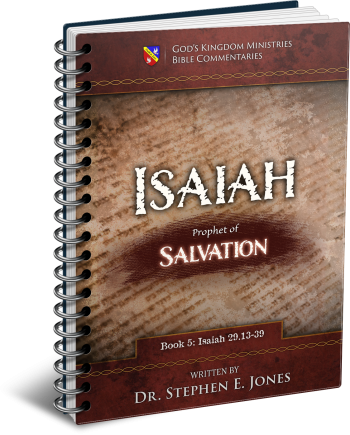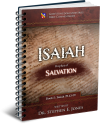Latest Posts
View the latest posts in an easy-to-read list format, with filtering options.

Isaiah is the prophet of Salvation. He is also known as the truly "Universalist" prophet, by which is meant that He makes it clear that salvation is extended equally to all nations and not just to Israel. He lived to see the fall of Israel and the deportation of the Israelites to Assyria, and he prophesied of their "return" to God (through repentance). He is truly a "major prophet" whose prophecies greatly influenced the Apostle Paul in the New Testament.
Category - Bible Commentaries

The prophecies about the judgment of the nations in Isaiah 13-34 all point toward the great judgment upon the Assyrian army in the historical chapters (36-39). God’s deliverance of Jerusalem proved to be a temporary reprieve, because a century later in the time of Jeremiah, the city was destroyed by the Babylonian army.
We see from this that the earthly Jerusalem was not given a divine exemption from judgment. Jerusalem’s judgment was merely postponed. On the other hand, the city’s final judgment did not occur in the time of Jeremiah, nor even in the first century at the hand of the Romans, for on each occasion the city was rebuilt and reoccupied. Because the city is still with us to this day (2021), it is clear that the word of the prophets has not yet been fulfilled entirely.
Nonetheless, when we study Isaiah’s historical record of the siege of Jerusalem that occurred in his day, it is clear that we must view it as an early beginning of an end-time fulfillment.
Isaiah 36:1, 2 sets the stage, saying,
1 Now in the fourteenth year of King Hezekiah, Sennacherib king of Assyria came up against all the fortified cities of Judah and seized them. 2 And the king of Assyria sent Rabshakeh from Lachish to Jerusalem to King Hezekiah with a large army. And he stood by the conduit of the upper pool on the highway of the fuller’s field.
This gives us a summarized account from 2 Kings 18:13-37. The Assyrian army had already taken Samaria and had deported the Israelites to Assyria. The army had swept through Judah and had taken “all the fortified cities of Judah” (2 Kings 18:13).
The Prism of Sennacherib claims that 46 walled cities of Judah were captured and that more than 200,000 Judahites were deported to Assyria.
All that was left of Judah was Jerusalem itself and the refugees who were able to crowd into the city. The Assyrian army was then laying siege to Lachish on the southern border between Philistia and Egypt. Sennacherib was confident that he would shortly take Lachish, so he sent a large portion of his army to begin the siege of Jerusalem under the leadership of General Rabshakeh.
As we have already shown, Rabshakeh’s name means “chief cupbearer,” or “chief wine-pourer,” and from the standpoint of prophecy, he was called to give Jerusalem God’s cup of wrath. Hence, Rabshakeh is the one who delivered the message that Hezekiah should capitulate immediately. If he were to open the gates of the city to the Assyrians and accept their rule, he would be killed but the people would live. If he chose to resist, he would be tortured and the defenders would be killed.
The example of Assyrian policy can be seen in the Assyrian record itself, for this is how they treated the king of Lachish and its defenders. No doubt Hezekiah understood this, and this presented him with a dilemma. His decision would affect the people that he ruled.
Rabshakeh communicated his message by “the upper pool” just outside of the city wall. This was where Isaiah had met with Hezekiah’s father, Ahaz, many years earlier (Isaiah 7:3) to give counsel regarding the war with Syria and Israel. The prophet told Ahaz that God would deliver Judah. Nonetheless, Judah had appealed to Assyria for help, and his unwise appeal had finally come to fruition. Ahaz should have appealed to God for help, and he should have called for a national day of repentance; but he had instead appealed to the flesh and there was no repentance.
So even though God did indeed deliver Judah from Syria and Israel at that time, the judgment of God had finally reached the moment of truth when Rabshakeh delivered his message to Hezekiah from “the upper pool.”
We should also note that when Isaiah spoke with King Ahaz years earlier, he also prophesied a sign of deliverance that “a virgin will be with child and bear a son, and she will call His name, Immanuel” (Isaiah 7:14). The son prophesied ultimately of Jesus Christ, but the prophet also connected that child to the remnant of grace. For this reason, Isaiah was told to bring his own son, Shear-jashub, whose name means “the remnant will return.”
This set the stage for the later prophecy given to Hezekiah about the birth of his own son, Manasseh, which also foretold a greater fulfillment in the birth of the overcoming remnant.
So we see that Rabshakeh’s message, delivered at the upper pool, was the culmination of prophecies given many years earlier, which also had implications for the far future in the coming of the Messiah as well as the birth of the overcoming remnant at the end of the age.
Isaiah 36:3 says,
3 Then Eliakim the son of Hilkiah, who was over the household, and Shebna the scribe, and Joah the son of Asaph, the recorder, came out to him.
Recall from Isaiah 22:20-23 that Shebna had once held the key of David as the chief of staff, but by this time he had been replaced by Eliakim. So Eliakim is pictured as the leader of the three who went out to talk to Rabshakeh.
Isaiah 36:4-6 says,
4 Then Rabshakeh said to them, “Say now to Hezekiah, Thus says the great king, the king of Assyria, ‘What is this confidence that you have? 5 I say, Your counsel and strength for the war are only empty words. Now on whom do you rely, that you have rebelled against me? 6 Behold, you rely on the staff of this crushed reed, even Egypt, on which if a man leans, it will go into his hand and pierce it. So is Pharaoh king of Egypt to all who rely on him’.”
Rabshakeh chides Hezekiah for trying to make an alliance with Egypt, something that the prophet also condemned in Isaiah 31:1. So far, Rabshakeh was prophesying inadvertently as he presented his cup of wrath to Hezekiah.
He continues in Isaiah 36:7,
7 “But if you say to me, ‘We trust in the Lord our God,’ is it not He whose high places and whose altars Hezekiah has taken away and has said to Judah and to Jerusalem, ‘You shall worship before this altar’?”
In the first year of his reign, Hezekiah had re-opened the temple and had repaired it (2 Chron. 29:3). He had restored the worship of the true God of Israel, ending the period of apostasy that his father Ahaz had instituted. Then the nation had celebrated the Passover for the first time in a very long time. But because they needed more time to cleanse the priests, they decided to celebrate the Second Passover (2 Chron. 30:2, 3, 15).
2 Chronicles 30:26 says,
26 So there was great joy in Jerusalem, because there was nothing like this in Jerusalem since the days of Solomon the son of David, king of Israel.
After this Passover celebration, the people destroyed the altars to false gods throughout the land of Judah. 2 Chron. 31:1 says,
1 Now when all this was finished, all Israel who were present went out to the cities of Judah, broke the pillars in pieces, cut down the Asherim and pulled down the high places and the altars throughout all Judah and Benjamin, as well as in Ephraim and Manasseh, until they had destroyed them all. Then all the sons of Israel returned to their cities, each to his possession.
Rabshakeh had done his homework. He knew about these reforms, and he knew that there was a faction in Jerusalem that resented Hezekiah’s destruction of their preferred religion. Hence, he appealed to that faction, knowing that they would pressure Hezekiah to submit to the king of Assyria. The implication was that Hezekiah had stirred up the anger of their (false) gods and that this was the cause of the present crisis.
Rabshakeh continues in Isaiah 36:8-10,
8 “Now therefore, come make a bargain with my master the king of Assyria, and I will give you two thousand horses, if you are able on your part to set riders on them. 9 How then can you repulse one official of the least of my master’s servants and rely on Egypt for chariots and for horsemen? 10 Have I now come up without the Lord’s [Yahweh’s] approval against this land to destroy it? The Lord [Yahweh] said to me, ‘Go up against this land and destroy it’.”
Rabshakeh makes the point that even if he were to give Hezekiah a gift of 2,000 horses, Egypt would not give him any chariots for those horses to be used in war. He knew that Hezekiah had failed to get help from Egypt. He then prophesied that Yahweh Himself had sent him to conquer Judah and to destroy Jerusalem.
That was, of course, true, even though Rabshakeh was probably being facetious. The prophets all agree that God was the one bringing judgment upon Judah. One cannot simply dismiss the word of an ungodly man, for God is able to speak through the unrighteous as well as the righteous.
In fact, our ability to hear God’s voice is weak until we are able to hear His voice coming from our worst enemies. So also, John heard the voice of God coming from Caiaphas (John 11:49-51).